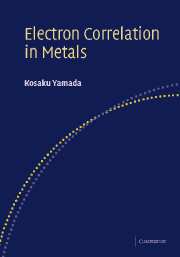Crossref Citations
This Book has been
cited by the following publications. This list is generated based on data provided by Crossref.
Tsujii, N.
Kontani, H.
and
Yoshimura, K.
2005.
Universality in Heavy Fermion Systems with General Degeneracy.
Physical Review Letters,
Vol. 94,
Issue. 5,
Kontani, Hiroshi
and
Yamada, Kosaku
2005.
From Kondo Effect to Fermi Liquid.
Journal of the Physical Society of Japan,
Vol. 74,
Issue. 1,
p.
155.
Oh, Sangchul
and
Kim, Jaewan
2006.
Entanglement of an impurity and conduction spins in the Kondo model.
Physical Review B,
Vol. 73,
Issue. 5,
Zlatić, V.
Monnier, R.
Freericks, J. K.
and
Becker, K. W.
2007.
Relationship between the thermopower and entropy of strongly correlated electron systems.
Physical Review B,
Vol. 76,
Issue. 8,
Hara, Hideyuki
and
Kontani, Hiroshi
2007.
Theory of Thermal Conductivity in High-Tc Superconductors below Tc: Comparison between Hole- and Electron-Doped Systems.
Journal of the Physical Society of Japan,
Vol. 76,
Issue. 7,
p.
073705.
Tsujii, Naohito
Kontani, Hiroshi
and
Yoshimura, Kazuyoshi
2007.
Degeneracy Dpendence of the Kadowaki–Woods Relation in Heavy-Fermion Systems.
Journal of the Physical Society of Japan,
Vol. 76,
Issue. Suppl.A,
p.
174.
Sakai, Osamu
and
Shimizu, Yukihiro
2007.
Band Calculation for Ce–Pnictides on the Basis of Dynamical Mean Field Theory.
Journal of the Physical Society of Japan,
Vol. 76,
Issue. 4,
p.
044707.
Kontani, Hiroshi
2007.
Theory of Infrared Hall Conductivity Based on the Fermi Liquid Theory: Analysis of High-Tc Superconductors.
Journal of the Physical Society of Japan,
Vol. 76,
Issue. 7,
p.
074707.
Nakajima, Y.
Shishido, H.
Nakai, H.
Shibauchi, T.
Behnia, K.
Izawa, K.
Hedo, M.
Uwatoko, Y.
Matsumoto, T.
Settai, R.
Ōnuki, Y.
Kontani, H.
and
Matsuda, Y.
2007.
Non-Fermi Liquid Behavior in the Magnetotransport of CeMIn5 (M: Co and Rh): Striking Similarity between Quasi Two-Dimensional Heavy Fermion and High-Tc Cuprates.
Journal of the Physical Society of Japan,
Vol. 76,
Issue. 2,
p.
024703.
Hanzawa, Katsurou
and
Ohara, Keiichi
2007.
Asymptotic local moment formation in the Kondo lattice.
Physical Review B,
Vol. 76,
Issue. 18,
Yamaguchi, K.
Yamanaka, S.
Isobe, H.
Hagihara, M.
Yamaki, D.
Nishihara, M.
Kitagawa, Y.
Kawakami, T.
and
Okumura, M.
2008.
N‐bands Hubbard models. IV. Comparisons of electron‐ or hole‐doped quaternary oxypictides LaOMPn superconductors with cuprates.
International Journal of Quantum Chemistry,
Vol. 108,
Issue. 15,
p.
3016.
Kontani, Hiroshi
2008.
Anomalous transport phenomena in Fermi liquids with strong magnetic fluctuations.
Reports on Progress in Physics,
Vol. 71,
Issue. 2,
p.
026501.
Zlatić, V.
Monnier, R.
and
Freericks, J. K.
2008.
Enhancement of thermal transport in the degenerate periodic Anderson model.
Physical Review B,
Vol. 78,
Issue. 4,
Otsuki, Junya
Kusunose, Hiroaki
and
Kuramoto, Yoshio
2009.
Evolution of a Large Fermi Surface in the Kondo Lattice.
Physical Review Letters,
Vol. 102,
Issue. 1,
Ohara, Keiichi
and
Hanzawa, Katsurou
2009.
Itinerant to Localized Transition and Metamagnetism in the Kondo Lattice.
Journal of the Physical Society of Japan,
Vol. 78,
Issue. 4,
p.
044709.
Otsuki, Junya
Kusunose, Hiroaki
and
Kuramoto, Yoshio
2009.
The Kondo Lattice Model in Infinite Dimensions: I. Formalism.
Journal of the Physical Society of Japan,
Vol. 78,
Issue. 1,
p.
014702.
Tada, Y.
Kawakami, N.
and
Fujimoto, S.
2010.
Spin fluctuations and superconductivity in noncentrosymmetric heavy fermion systemsCeRhSi3andCeIrSi3.
Physical Review B,
Vol. 81,
Issue. 10,
Sato, K.
Naka, T.
Taguchi, M.
Nakane, T.
Ishikawa, F.
Yamada, Y.
Takaesu, Y.
Nakama, T.
de Visser, A.
and
Matsushita, A.
2010.
Weak itinerant ferromagnetism in Heusler-typeFe2VAl0.95.
Physical Review B,
Vol. 82,
Issue. 10,
Otsuki, Junya
2011.
Continuous-Time Quantum Monte Carlo Study of Local Non-Fermi Liquid State in the Multichannel Anderson Model.
Journal of the Physical Society of Japan,
Vol. 80,
Issue. Suppl.A,
p.
SA129.
Chandra Shekar, N. V.
Kathirvel, V.
Shukla, B.
and
Sahu, P. Ch.
2012.
Phase Transitions and Structural Stability of Binary Uranium Intermetallics Under High Pressure: A Review.
Proceedings of the National Academy of Sciences, India Section A: Physical Sciences,
Vol. 82,
Issue. 3,
p.
163.





